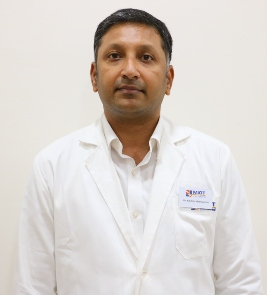MIOT Advanced Centre for Gastrointestinal and Liver Diseases
Hepato-Pancreato-Biliary Surgery
Overview
Treating the body’s most complex organ system
The hepato-pancreato-biliary system is comprised of the liver, pancreas, gallbladder and bile ducts. Together, they are responsible for over 3600 functions in the body, including processing food, absorbing nutrition and disposing off toxins and waste.
Delayed symptoms are a characteristic of most diseases related to the hepato-pancreato-biliary system and few health care institutions offer the highly specialised care that they require, particularly in surgery and transplants. The MIOT Hepato-Pancreatico-Biliary Centre for Surgery and Transplantation has the experience, expertise and infrastructure to take on the challenge.
Liver Transplant
The success of a liver transplant depends on the quality of the donor organ and also the right facilities and expertise. At MIOT International, these include a world-class surgical & intensive care team, sophisticated imaging and radiology facilities, advanced laboratory services, surgical and ICU facilities, a dynamic blood bank, specially-trained nursing staff, counsellors and nutritionists.
Treatments and Procedures
Biliary system
- Laparoscopic cholecystectomy
- Laparoscopic /open bile duct stone removal
- Repair of bile duct injuries
- Excision of choledochal cyst and bile ducts cancers
Pancreas
- Whipple’s procedure
- Pancreatectomy (central, distal, subtotal, total)
- Pancreatojejunostomy
- Frey’s procedure
- Pancreatic necrosectomy
- Cystenterostomy and cystogastrostomy for pseudocysts of pancreas
- Pancreatic tumour e-nucleation
Liver
- Hepaticojejunostomy
- Liver resection for liver cancers and hydatid cysts
- Hepato-pancreato-duodenectomy
- Radiofrequency ablation of tumours
- Laparoscopic procedures
- De-roofing of cyst
- Hepatectomy
- Metastasectomy
Liver Transplant
The liver is the second most-transplanted organ. During liver transplant surgery, surgeons remove all, or part of, the patient’s diseased liver and replace it with a healthy liver from a donor. The donor-liver could come from a cadaver or a living donor. Most transplants are done with a cadaveric organ.
Meet the Doctors

Dr. Surendran Rajagopal
MBBS, MS, MNAMS, M.Ch,
Chairman Emeritus - Department of Hepato-Pancreato-Biliary Surgery & Liver Transplantation, MIOT International
Dr. Surendran Rajagopal is one of India’s foremost and most renowned hepato-pancreato-biliary surgeons, Dr. Surendran has over two decades experience in this speciality. Before he joined the MIOT family, he was Director, Institute of SGE and Centre for GI Bleed and Hepato-Biliary-Pancreatic Diseases (an ISO 9001-2000 organisation) at the Government. Stanley Medical College and Hospital, and Senior Consultant for Gastrointestinal Surgery at Apollo Hospitals.
During the course of his illustrious career, he established the only successful liver transplant in government sector anywhere in India. He also established the Cadaver Maintenance Programme – the first of its kind in the whole world – and the Stem Cell Programme at Government Stanley Hospital.
Dr. Surendran Rajagopal has published extensively on his speciality and also participated in, and made presentations at, a number of workshops, CMEs and conferences. He is a member of several organisations: Association of Surgeons of India; Indian Society of Oncology; Indian Association of SGE; International Gastro-Surgical Club; the Indian Chapter of Hepato-Biliary-Pancreatic Society; and the Association of Colorectal Surgeons of India.
Dr. Surendran has won numerous awards and accolades for his work. He was adjudged Best Outgoing Student of Stanley Medical College in 1975 and named Best Doctor by the Government of Tamil Nadu in 2002. He has also received the Special Mention Award from the Government of Tamil Nadu in 2010 and an honorary degree – D Sc (Hon) – from Tamil Nadu Dr. M. G. R. University.

Dr. Karthik Mathivanan
M.B.B.S, DNB (Fellowship in Liver & Multi-Organ Transplant),
Program Director - Department of Liver & Multi-Organ Transplant & HPB Surgeon, MIOT International.
His areas of expertise include:
- Acute Liver Failures
- ABO Incompatible Transplant
- Elderly Recipients
- Recipients with Extreme BMI
- SWAP Transplant
- Domino Transplant
- Split Liver Transplant
Dr. Karthik Mathivanan has been a core team member in over 2,000 transplant surgeries, demonstrating proficiency in complex and high-risk liver surgeries, particularly in living donor transplants. Dr. Mathivanan is a pioneer in advocating for ‘Organ Preservation,’ leading to numerous successful transplants. He is also an accomplished Kidney Transplant Surgeon, having performed over 1,000 successful kidney transplants.
He has achieved several revolutionary milestones in liver transplantation. He has published several influential articles in peer-reviewed medical journals. He is also affiliated with prominent organisations such as the International Liver Transplant Society (ILTS), the Liver Transplant Society of India (LTSI), and the Association of Surgeons of India (ASI). He is a Founder-Member of the Indian Liver Transplant Society.





